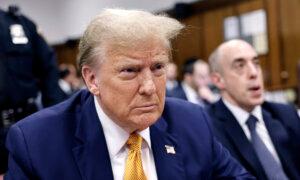The attorneys disagree with the district attorney on how much information should be released to the public.
President-Elect Donald Trump’s attorneys have alleged evidence of “grave juror misconduct” in his falsified business records case that has been playing out in New York.
The specific allegations are unclear, and recently released correspondence showed Trump’s attorneys disagreeing with Manhattan District Attorney Alvin Bragg’s office over how much information to release.
“To do so,” Merchan said, “would threaten the safety of the jurors. … Should a properly filed claim be submitted, these redactions will be revisited.”
He also indicated a hearing was needed to evaluate the claims but said that the defense opposed having a hearing. “Allegations of juror misconduct should be thoroughly investigated,” Merchan said. “However, this Court is prohibited from deciding such claims on the basis of mere hearsay and conjecture.”
Trump’s attorneys argued in their Dec. 3 letter that their client couldn’t pursue appropriate remedies until the U.S. Court of Appeals for the Second Circuit had ruled on Trump’s request to remove the case to federal court.
“[T]he excerpts of the communications that counsel did share included a communication from [redacted] in which [redacted] plainly stated that counsel’s recitation of the purported juror misconduct—the same misconduct chronicled in the Dec. 3 letter—‘contains inaccuracies and does not contain additional information that I never shared,’” the letter stated.
It added that “[a]ccording to counsel’s own recitation of events, [redacted] rejected several attempts to get [redacted] to endorse the factual allegations that serve as the basis of the Dec. 3 letter.”
The letter went on to accuse Trump of failing to provide an adequate record.
“Had defendant provided the sworn allegations required to make a proper motion … a hearing at which [redacted] allegations could be fully explored in a public forum might indeed be warranted,” it read.
“What he seeks instead is to inject his unsworn, untested, and at least partially inaccurate allegations into the public domain while simultaneously opposing any endeavor to properly evaluate them.”
A series of successive letters from the defense and prosecution followed with Trump’s attorneys accusing Bragg’s office of trying to keep important information secret. While his attorneys favored certain redactions, they indicated they thought the prosecution’s requests went too far and said that the public had a right of access to criminal proceedings.
Merchan’s Dec. 16 letter stated that the court “must balance the competing interests of the public’s right to transparency of these proceedings against the very real need to protect the privacy and safety of the jurors.”
The president-elect said the case itself is illegitimate, and the opinion written by Merchan “goes against our Constitution, and, if allowed to stand, would be the end of the Presidency as we know it.”
Merchan said that Trump waited too long or failed to preserve objections to evidence and that information related to both preserved and unpreserved arguments did not receive protection under the doctrine of presidential immunity.
On TruthSocial, Trump said that “Merchan has so little respect for the Constitution that he is keeping in place an illegal gag order on me.”
Matthew Vadum and Jack Phillips contributed to this report.
Original News Source Link – Epoch Times
Running For Office? Conservative Campaign Consulting – Election Day Strategies!


